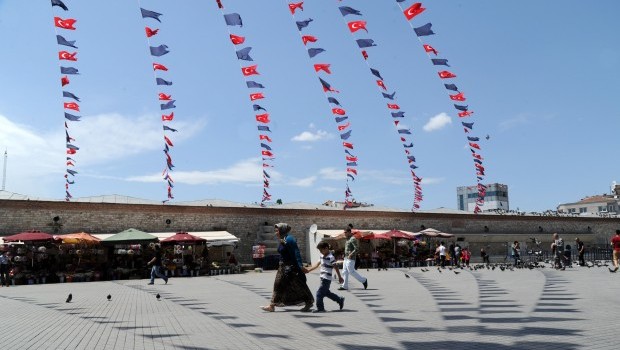
Turkish and European Union flags fly together as people walk under them at Taksim Square on May 24, 2013, in Istanbul. (AFP Photo/Bulent Kilic)
The fact that Turkey has recently emerged as one of the leading government donors of humanitarian aid may come as a surprise to many, especially as the country was struggling with one of its worst economic crises just a decade ago. According to a recent report published by Global Humanitarian Assistance, Turkey spent more than USD 1 billion on humanitarian assistance in 2012 and ranked fourth in a list of the world’s top donors, after the United States, the European Union and the United Kingdom. The report speculated that a significant proportion of Turkey’s contribution was spent on aid to Syria and housing Syrian refugees within Turkey. Last month, TIKA head Serdar Çam stated that the agency had spent USD 2.5 billion on foreign aid in 2012.
There are two major reasons for Turkey’s sudden transformation into an “emerging donor,” according to a Turkish official. The first is related to the improvement in the Turkish economy. Turkey’s economic recovery has been impressive: while the world plunged into financial crisis, Turkey has been registering record growth levels. “Economic resources have increased, enabling Turkey to earmark a budget for international humanitarian aid,” the official explained, adding that the second reason was the political will. “The government has the will to use economic resources for international humanitarian assistance.”
While the recipient countries range from Cuba to Mongolia, Africa has a central place in Turkey’s humanitarian aid policies. Turkey’s increased presence and activism, especially in sub-Saharan Africa, are a source of curiosity for countries with a colonial past. “Why is Turkey in Africa?” is a question I hear often from Western diplomats who seem wary of the new kid on the block.
However, there are several distinctions that make Turkey’s standing in the region different from the other players. The first is the lack of a colonial legacy. With relations dating back to the time of the Ottoman Empire, Turkey enjoys a positive image in sub-Saharan Africa. Another difference is the way in which Turkey uses its soft power. Turkish prime minister Recep Tayyip Erdoğan’s 2011 visit to Somalia certainly did a lot to boost his image abroad, when he spent the night in Mogadishu with his family. He was the first non-African leader to visit the country in two decades. “The message was, I care so much about you that I will spend the night and will do that with my wife. This is not just soft power; this is humanity itself,” an African official told me.
While Turkey’s soft power approach seems so far to have won the hearts and minds of some Africans, the rhetoric Turkish officials use is disturbing to many others. A phrase I often hear punted around by Turkish officials, “Whatever we are doing in Africa, we are not expecting anything in return,” undermines their aid. The recipients do not want to be considered so naïve they would believe such self-sacrificial claims. “Turkey is no salvation army,” said one African participant at a recent conference on peace and security in the Horn of Africa held in Istanbul.
With aspirations to become a regional player with a global say, the Justice and Development Party (AKP) government is well aware of the importance of the humanitarian assistance as a tool that provides weight in the international arena. In fact, Turkey stepped up its international assistance during its campaign to bid for a 2009–2010 UN Security Council non-permanent seat, which it won by a high margin. Turkey is once again a candidate for the seat, this time for the 2015–2016 term.
Humanitarian assistance also opens the door for increased bilateral business deals. This process was explained by Professor Alpaslan Özerdem from Coventry University in an article that appeared in the Guardian: “Once an African country is identified for bilateral relations by the Turkish foreign ministry, a diplomatic presence will be established, Turkish Airlines will launch a flight destination and economic links will be formed by globally active Turkish companies.”
A number of Turkish schools run by the Gülen Movement—a transnational Islamic and social movement—also play an active role in consolidating relations, according to Özerdem.
However, as Özerdem observed in his article, Turkey’s greater involvement in humanitarian assistance is not going to be a trouble-free venture. A Turkish police officer was killed in July, along with three attackers, when an explosives-laden car was rammed into an office building housing Turkish embassy staff in the Somalian capital. Denouncing Turkey’s involvement as a cover for Western “invaders,” the Al-Qaeda-affiliated Al-Shaba’ab group claimed responsibility. However, Turkey has re-confirmed its commitment to Somalia while announcing it will start construction work on one of Turkey’s biggest diplomatic compounds in Mogadishu.
This article was originally published in The Majalla.
